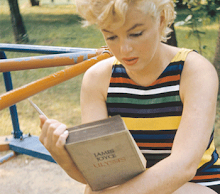 howl's moving castle
howl's moving castleSo, it has finally happened. Neon Bible, Arcade Fire's new album has been leaked online. Neon Bible and I have been hanging out for a good week now, and I can safely say, it is heartbreaking. But, as with all things Arcade Fire, it took some persistence. Unlike the density of Funeral and the lo-fi Us Kids Know EP, the production of Neon Bible is suitably glittering, shot-through with a Sufjan Stevens-esque sparkling and more bells and whistles than you’d find at an illegal rave. It was a tad alarming and upsetting at first, but please believe me when I say that this one’s a beauty, and may be the best album we’ll get all year.
However, my alarm and upset peaked when the heart-thumping No Cars Go from the Us Kids Know EP, made an appearance on Neon Bible. No Cars Go is my favourite Arcade Fire song, precisely because it makes me want to run away from everything. It induces joy, fear, excitement and sadness all in the space of six minutes and makes me feel ready for everything and nothing.
The EP version of No Cars Go is like riding a runaway train in the middle of a thunderstorm. Opening with murmured recorded voices and the sound of rain drops against the windowpane, it breaks through into something that sounds like a high speed chase on all fours through the forest. In spirit alone, it always makes me think of Kate Bush’s Hounds of Love. The EP version with its chunky, pounding drumbeat and piercing, over excitable accordion, sounds both frightened and frightening. Win’s controlled, smooth vocals are counterbalanced by Régine’s shrill, piercing, uncomfortably fragile harmonies, the two of them acting as a two-piece piped piper to the clattering, frantic drumming and hypnotic bass-line that chases them through the song. If you’ve seen the Studio Ghibli adaptation of Diana Wynne Jones’s Howls Moving Castle, you’ll know what I mean when I say the song moves like the castle, a rusty shambolic mess, on the verge of toppling at any moment. As the song slows down into its dream/nightmare ending with the refrain ‘between the click of the light and the start of the dream’ the song is compressed into a tight, panicked heartbeat, never losing its restless guitar backing, before building into a manic corkscrew of drumbeats. Beneath this wailing racket, a distant man’s voice, as if heard through a hailstorm, can barely be heard shouting ‘I don't want any pushing, and I don't want any shoving. We're gonna do this in an orderly manner. Women and children! Women and children! Women and children, Let's go! Old folks, let’s go!’ He sounds desperate, almost on the verge of tears, as if he knows his enterprise is hopeless. As the song builds through a series of sighs and wails, it sounds like a shipwreck, hurled around a whirlpool that finally sucks the song under, leaving just the pitter-patter of water behind. It is terrifying.
If the EP version is fearful, the new version is fearless. Instead of an opening of mumbled voices and distant thunder, we get flourishes of strings, brass and wind instruments, fluttering and stirring as if waking from a restful night’s sleep, before being catapulted headlong into the song, only faster. It reminds me of the shuddering sections of The Chemical Brothers’ Star Guitar, with its travelling, rhythmic video, except in contrast to Star Guitar’s mellow dance beats, this sounds like a rollercoaster ride. Indeed, everything is lighter, brighter, louder. Louder shouts, bursting strings and clearer, booming vocals. Gone is the mournful accordion in favour of piccolos fighting horns against strings. Gone is the clanking mechanised unrest of the EP version, and in comes a faster, dressier, flashing neon version. Whispering strings and shy, flirty brass back the purity of the calmer ‘between the click of the light and the start of the dream’ section. Régine’s broken vocals have been repaired. The song builds gently, the accordion making a reappearance, but held by a full, soaring orchestra. The man’s voice, calling on babies, women and children to join him in his escape is stronger, in control. Instead of Régine and Win’s lonely, strangled wails, an entire chorus of voices, backed by a surging drum beat, excitable orchestra and intense electro-beats whips the song into a flurry of blissful sound. If the EP version ends with the sense that the entire song has fallen into the abyss, Neon Bible’s interpretation sounds like the song has been carried by some giant wave and miraculously landed on the shores of utopia. It is a cleaner, dazzling version, but also leaner, and even ruthless. It may have lost some of its vulnerability and uncertainty, and with it, perhaps some charm. But it has gained in maturity, confidence and intensity. The Neon Bible version of No Cards Go is 19 seconds shorter than the EP version, but its speed and power make it feel half the length. Initially, I found it overdone, but I now think it’s perfect.
In the Observer Review this week, Kitty Empire has enjoyed a good old rant on indie band’s second bloated albums, berating The Killers, Bloc Party, Muse and Coldplay for plundering the mine of Bruce Springsteen stadium-shakers. Broadly, I agree wholeheartedly, and I, too, am a bit frightened when I think about The Kaiser Chiefs trying to do ‘serious’. Weirdly though, Ms Empire also puts ‘indie darlings’ Arcade Fire in the same category, but I’m not really sure that a band which boasts musicians from Belle Orchestre can really be compared with the old three guitars and a drummer line-up. The whole point of Arcade Fire is that they are about bombast and noise, only delivered directly to your door with almost suffocating intimacy. They get under your skin.
To put it another way, The Kaiser Chiefs are to John Hegley what Arcade Fire are to John Milton. (Pseudo-epic Muse, on the other hand, are closer to Tolkien: I know lots of people love it, but I have better things to do than worry about orcs.)





